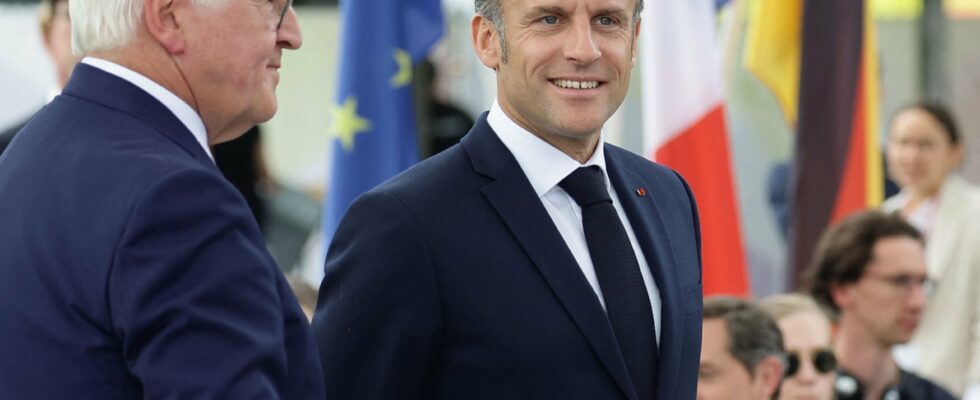As Germany celebrates this Sunday, May 26, the 75th anniversary of its “Basic Law”, the German Constitution, the French President, Emmanuel Macron, begins a state visit across the Rhine – the highest level of protocol for presidential travel – of three days. This is the first state visit to the country since that of Jacques Chirac in 2000, twenty-four years ago. It will end with a Franco-German council of ministers near Berlin.
Protocol requires, Emmanuel Macron and his wife Brigitte were welcomed by the German President, Frank-Walter Steinmeier, whose function is essentially honorary. Chancellor Olaf Scholz, who holds most of the executive power, is only expected to be present from Tuesday, but with President Steinmeier also serving as foreign minister and vice-chancellor to Angela Merkel, politics is expected to be on the menu of the meeting. The opportunity to turn the page on angry subjects? For several years, the Emmanuel Macron – Olaf Scholz couple has displayed fundamental disagreements on several subjects.
The war in Ukraine
The most recent disagreement concerns the response to help Ukraine face the Russian army. On several occasions – in February, in March, and more recently in May in the British daily The Economist – Emmanuel Macron had declared that Ukraine’s allies should ask themselves the question, and not rule out, sending Western soldiers on the ground. A position far from being unanimous in European countries, including Germany. According to Nils Schmid, spokesperson for the SPD, Olaf Scholz’s party, to the German newspaper Tagesspiegelthe chancellor clarified in February that there would be “no immediate participation in the war by Germany and NATO”, a position “which will not change”.
“We do not need […] discussions on the fact of having more or less courage”, the German Minister of Defense reacted in March, while Emmanuel Macron called on the allies to “not be cowards”.
Germany remains the largest European aid contributor to Ukraine, according to a report from the Institute for the World Economy in Kiel. In mid-March, Paris committed to providing “up to 3 billion euros” in additional military aid to kyiv in 2024, and Berlin has already released 1.1 billion euros out of 7 billion in total for 2024 .
Another sticking point concerns the delivery of “Taurus” missiles to Ukraine, requested in particular by the United Kingdom and which has so far been refused by Germany. France and the United Kingdom have already sent long-range Scalp and Storm Shadow missiles to Ukraine.
European defense
After a speech on Europe on Thursday April 25 at the Sorbonne, the French head of state said he was ready to “open the debate” on a European defense which would include “anti-missile defense, missile weapons firing long range, nuclear weapons for those who have them or who have American nuclear weapons on their soil. If for the German Chancellor, the idea of a European nuclear weapon is “unrealistic”, according to comments published Thursday in The Economisthe agrees with Emmanuel Macron on the fact that Europe needs closer military collaboration.
“I welcome the fact that the French president has underlined the European dimension of the French strike force,” he wrote in this article. “In addition to nuclear deterrence, we envision robust conventional forces, air and missile defense, as well as cyber, space and high-precision strike capabilities.” A recent agreement was also signed between the two French and German defense ministers on a future Franco-German tank.
Economic policies
“I am calling for a new economic paradigm, a new growth model, and that is what I will try to convince the Germans,” declared Emmanuel Macron in an exclusive interview published Wednesday in L’Express.
“Our duty is to redouble our commitment with Germany, to invent this new model together and take bold initiatives. Exactly as we did in 2020, with Chancellor Merkel, where, a few months after the start of Covid , we had taken a position, until then considered unthinkable: a common debt.”
However, Olaf Scholz, former Minister of Finance nicknamed Scholzomat (pun with “automat”, to mock his rigor and austerity) across the Rhine, was never very favorable to it and opposed it for example in 2022 “What we don’t need is a new common European debt,” said German Finance Minister Christian Lindner on April 11.
Climate protection and energy policy
Another source of tension concerns the energy policy of the two countries, which have very different decarbonization strategies. France is promoting its nuclear energy, and planning the construction of new reactors, while Germany has announced the definitive closure of its power stations. France succeeded in integrating nuclear power into the 42.5% renewable energy target set by a European directive last November, which a bloc of other countries including Germany was opposed to.
In January, while the reform of the European electricity market passed a month ago had not yet been ratified, discussions were once again blocked between Germany and France. The German Minister of the Economy, Robert Habeck, then assured that the disagreement had “for once nothing to do with the form of energy, whether nuclear or renewable” but with “the organization of market in both countries.
The EU – Mercosur agreement
France opposed the trade agreement between the European Union and the South American countries of Mercosur. Visiting Brazil at the end of March, Emmanuel Macron even stressed that he found it to be a “very bad agreement” and declared that he would like the conclusion of a new agreement, which would take into account, among other things, the environmental standards of the EU.
Germany, like many European countries, is in favor of this free trade treaty. The German industrial sector sees this as an opportunity to find new outlets.
